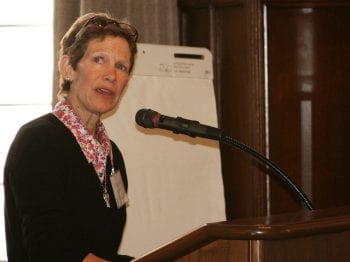Researchers and practitioners from around the globe met at the Brown School at Washington University in St. Louis this week to make strides toward increased financial awareness of children and youth. 
The Child & Youth Finance International (CYFI) meeting, hosted by the Center for Social Development, drew 45 attendees who represented organizations and institutions in 10 countries.
It was significant to hear the different voices represented at the table during this meeting, said Jared Penner, head of CFYI’s Education Division. “We are a global network, so we want people from different regions bringing their perspectives.” He said the meeting yielded some clear priorities for the group and helped set mandates for moving forward.
CYFI, based in Amsterdam, is an international organization with the goal of providing every child with “access to financial services, financial awareness through education, a reliable source of income and the will to save and build assets to promote their future stability.” This concept of “economic citizenship” is crucial to the well-being of children, families, communities and countries.
The meeting united two CYFI working groups: Academic, which conducts research to determine best practices in moving toward these goals, and Education, which seeks to establish a financial education framework and teacher training models. The groups reviewed concepts and activities, and developed strategy for research initiatives and action plans.
Lew Mandell of the University at Buffalo, a CYFI board member and conference facilitator for the Academic Working Group, said the group firmly believes in the importance of this research in the field of financial education. “We feel it’s possible to educate people in just about everything,” he said. “It’s just a matter of figuring out how to go about it.”
Margaret Sherraden, faculty associate at CSD and professor of social work at the University of Missouri – St. Louis, led the publication of a white paper on this subject titled “Children and Youth as Economic Citizens: Review of Research on Financial Capability, Financial Inclusion and Financial Education.” She said that although they talk about increasing a person’s financial capability, they don’t believe it exists only in an individual. “Financial capability resides between the individual and the environment,” Sherraden said. “Therefore, it’s not enough to change individual behavior.”
The Education Working Group aims to find ways to educate children and communities, teaching not only financial skills, but also cognitive, personal and social skills. Education can be cognitive – learning through a class or lesson – or non-cognitive – learning through actions. For example, Mandell pointed out that parents can begin to instill saving behavior when their children are very young. “If people begin saving before they understand the importance of saving, that is non-cognitive education,” he said.
Discussion centered on combining education with access – how to reach children, who will teach them and which products will appeal to young consumers. CYFI’s charge, once they determine content and delivery methods, is to take the efforts to scale. Their initial target is to reach 100 million children in 100 countries by 2015, ensuring they have financial access and education.
Moses Njenga of the Kenya Institute for Public Policy Research and Analysis (KIPPRA), and a researcher with the YouthSave Initiative said this topic is very appropriate for his work in Kenya. Many youth in his country are not economically engaged, and this meeting triggered several ideas for research in this field.
“I’m glad I came (to the meeting), because it was an opportunity to meet experts and assimilate myself into this research arena,” he said. “The meeting went very well, and I’m going home with a better idea of what needs to be done.”
Lina Kashyap of the Tata Institute of Social Sciences (TISS) in India became involved in CYFI last year because she found it interesting as a social work educator who has worked with children and young people. “As an educator at a university that does teaching and research, I felt I could contribute,” Kashyap said. She also is happy to support Jeroo Billimoria, founder and managing director of CYFI and a colleague of Kashyap’s at TISS.
Both the Academic and Education working groups began to develop action plans during the meeting, and they will continue refining those plans before reconvening at the CYFI Summit in Istanbul this May.